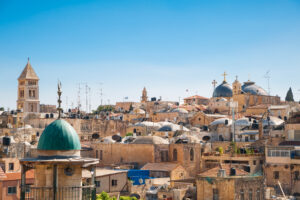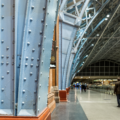What are the religious roots of the Israeli-Palestinian conflict?
What are the religious roots of the Israeli-Palestinian conflict?
The Israeli-Palestinian conflict is a long-lasting conflict between Israelis and Palestinians over the Land of Israel. But what are the religious foundations of this conflict?
The Israel-Palestine conflict
The Israel-Palestine conflict is a historical conflict between Israelis and Palestinians over the Land of Israel and some territories taken by Israel as a result of the Six-Day War. Palestinians considered these territories to be occupied. In general, the whole country of Israel is considered as controversial property by the Palestinians.[1]
While the Palestinians accuse Israel of “colonisation, expulsion and military occupation,” the Jewish people in Israel see their return to the Land of Israel as a return to the “land of their forefathers”[2] after ages of persecutions around the world in general, and after the Holocaust, more specifically. Yet, Israelis still do not feel safe in their new state, since they are being threatened both internally and by confining countries to be wiped off the map, and live with a feeling of constant danger and threat.[3] [4]
Different countries have attempted to resolve and put an end to this conflict as part of what is called the Israeli-Palestinian peace process. But is there a religious foundation to this conflict? How does religion play a role? In this article, we will focus less on the territorial conflict and more on the religious foundations of the conflict.[5]
It is all about Jerusalem
The most recent escalation of violence in Israel happened in May 2021. One of the many reasons that brought about this new escalation was caused by religious controversy in the area centred on the Al-Aqsa Mosque/Temple Mount. One of the reasons that started this last war – many argue – was that the head of the terrorist organisation, Hamas, warned Israel to remove its police forces from the Al-Aqsa Mosque (Temple Mount for Israelis) and threatened that failing to do so would bring a “heavy price.”[6] [7] [8] [9]
Why is Jerusalem so important?
A fundamental issue of the Israeli-Palestinian conflict is the issue of control over Jerusalem. This is a very delicate issue as both Jews and Muslims claim to be the one that deserves sovereignty over the city.[10] Why is Jerusalem so important?
Jerusalem is one of the most important and sacred places for all the three monotheistic religions – Judaism, Christianity, and Islam. For Christians, Jerusalem is the place in which Jesus was crucified and the site of the Church of the Holy Sepulchre.[11]
For Jews, Jerusalem is the holiest city as it hosted the Jewish Temple that was found on the Temple Mount (before its destruction) and is often called the ‘Holy Temple’ by Jews. Even today, Jews pray facing towards the Holy Temple and pray for the messianic reconstruction of the destroyed temple.[12] [13]
The Temple Mount and the entire Old City in Jerusalem were captured by Israel in 1967 during the Six-Day War.[14] [15] Since then, Jews have been allowed to visit the holy site – although with many restrictions imposed by the Israeli government. For instance, Jews – on the contrary of Muslims – are not allowed to pray while they are on the Temple Mount. This decision was taken by the Israeli government in order to avoid violence escalations and conflicts with Muslims in the area and to keep its peace agreement with Jordan in place.[16]
For Muslims, Jerusalem and the Al-Aqsa Mosque in particular are the third-most sacred site. The Al-Aqsa Mosque is considered as the place of destination of the Prophet Muhammad’s night journey which is described in the Quran. The Al-Aqsa Mosque is also the place of Muhammad’s ascent heavenwards thereafter.[17] Muslims consider the Temple of Jerusalem as something they have inherited. While according to the Jews, the Al-Aqsa Mosque is built on the top of their old temple, for Muslims the mosque is the Third Temple that came as a substitute for the old one.[18] [19] [20]
The power of religion
We have seen how a single city can be one of the most important and holy places for multiple religions. In the case of Israel, it appears that Muslims and Jews are not succeeding in finding a balance and collaboration. While Muslims believe that the mosque on the Temple Mount is one of the holiest places in their religion, Jews believe that the mosque was built exactly on the ancient place of their Holy Temple, while they dream of its reconstruction.
This religious conflict is quickly politicised by both Jews and Muslims and often leads to outbursts of violence and escalation in the area. This situation is therefore an example of how powerful religious beliefs can be, even in the 21st century. Moreover, it shows that ancient conflicts are still unresolved today. Only time will tell if – at the end of the day – Jews and Muslims will find a way to co-exist in this highly problematic area and with the background of their entangled histories.
To all news items ->
Our team of analysts conducts research on topics relating to religion and society. In the past month, the topics of traditions, tension, corona, and leadership were trending. Find out their relationships on the EARS Dashboard.
Sources
[4] Nikki Haley: ‘Israelis deserve to be safe in their homes’
[6]Hamas and Netanyahu Are Gambling Dangerously in Jerusalem
[7]Israeli police storm al-Aqsa mosque ahead of Jerusalem Day march
[8]Hamas chief: We will continue fighting until Al-Aqsa mosque is liberated
[9]After Jerusalem clashes, Hamas and Israel exchange fire
[10] Hamas and Netanyahu Are Gambling Dangerously in Jerusalem
[11] History of the Church of the Holy Sepulchre.
[12] Temple of Jerusalem | Description, History, & Significance
[13] Jerusalem Compass points way to Temple
[14] The Liberation of the Temple Mount and Western Wall (June 1967)
[15] Temple of Jerusalem | Description, History, & Significance
[16] Thanks to Jordan, Jews can’t pray on the Temple Mount – analysis
[17] Al-Aqsa Mosque: Five things you need to know
[18] A Brief History of the Temple of Jerusalem
[19] A Religion of the Covenant: The Centrality of Covenant Theology to the Islamic Faith ST540: Christian Encounter with Islam Dr. J
[20] Hamas and Netanyahu Are Gambling Dangerously in Jerusalem






